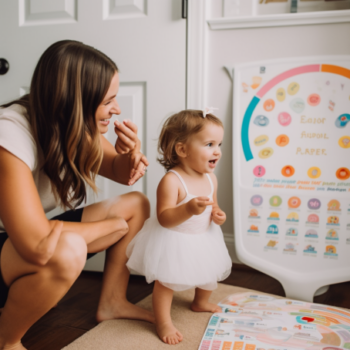Looking for potty training advice for special needs children? Discover the best resources that can help you navigate this important milestone. From books and online articles to specialized therapists and support groups, there is a wealth of information available. Experts in the field provide helpful tips, strategies, and techniques tailored to the unique needs of your child. Books like "The Potty Journey" and "Toilet Training for Individuals with Autism or Other Developmental Issues" offer practical advice and step-by-step guides. Online platforms also offer a range of articles, blogs, and forums where parents can share their experiences and seek advice. Additionally, consulting with a specialized therapist or joining support groups can provide valuable insights and support throughout the potty training process. Empower yourself with knowledge and guidance from these resources, ensuring a successful and comfortable transition for your special needs child.
Tag: potty training techniques
Tips for Successful Potty Training for Children with Special Needs: A Comprehensive Guide
Potty training can be a challenging task for all parents, but it can be even more daunting when it comes to children with special needs. However, with the right strategies and a little patience, successful potty training is absolutely achievable. One tip is to create a consistent routine and stick to it. Establish specific times for bathroom breaks to help your child develop a regular pattern. Additionally, using visual cues, such as pictures or charts, can be extremely helpful for children with special needs who struggle with communication. These visual aids can assist them in understanding the process and what is expected of them. Another effective tip is to choose appropriate and comfortable potty equipment. Specialized potty seats or adaptive toilet inserts can provide comfort and stability for children with physical disabilities. Lastly, positive reinforcement is key. Celebrate every small achievement and provide rewards or praise to motivate your child. Remember, each child is unique, so be patient, adapt to their individual needs, and maintain a positive attitude throughout the potty training journey.
Effective Techniques for Potty Training a Child with Special Needs
Potty training a child with special needs requires specific techniques tailored to their unique circumstances. One effective approach is to establish a consistent routine, ensuring the child knows when and where to go. Visual aids, like schedules or charts, can provide clear instructions and help them understand expectations. Patience is crucial, as children with special needs may require more time to grasp the concept. Positive reinforcement, such as praise or small rewards, can motivate and encourage progress. Sensory considerations, like using specific toilet seats or clothing, can also enhance comfort during the process. Lastly, seeking guidance from professionals, such as pediatricians or occupational therapists, can provide valuable insights and strategies for successful potty training.
Tips for Making Potty Training on the Go Less Stressful for Your Child
Potty training on the go doesn't have to be a source of stress for your child. With a few simple tips and tricks, you can make this transitional phase much smoother. Firstly, establish a routine and stick to it, ensuring your child knows when and where they can expect potty breaks. Invest in a portable and comfortable potty seat to provide familiarity amidst changing environments. Additionally, pack essential supplies such as wipes, disposable seat covers, and spare clothes to handle any accidents. Lastly, offer positive reinforcement and rewards to motivate your child during this challenging time. By implementing these strategies, you can help alleviate stress and make potty training on the go a hassle-free experience for both you and your child.
The Ultimate Guide: Choosing Between Rewards and Punishments for Potty Training
When it comes to potty training, many parents wonder whether to use rewards or punishments to encourage their child's progress. While both approaches have their merits, experts suggest that using rewards can be more effective and positive. Rewards can motivate children and create excitement around using the potty. Whether it's a sticker chart, small treats, or praise, these incentives can reinforce their good behavior. Punishments, on the other hand, may create fear and anxiety, potentially leading to setbacks in the potty training journey. By focusing on rewards, parents can create a positive and encouraging environment, making the process enjoyable for both parent and child.
Discover The Top Potty Training Methods To Help Your Child Succeed!
Potty training is an essential milestone for every toddler, and there are several methods to accomplish this task. The most common approaches include the traditional method, the child-led method, and the 3-day method. The traditional method involves parents setting a schedule for their child to use the potty, while the child-led method relies on the child's readiness to use the potty. The 3-day method involves intensive training over a few days to help the child understand the process quickly. Each approach has its pros and cons, and it's essential to choose the one that suits your child's personality and lifestyle. By understanding the different potty training methods, parents can choose the most effective way to help their child achieve success in using the potty.
6 Effective Ways to Encourage Your Child to Use the Potty
Teaching a child to use the potty can be a challenging task for many parents. However, with the right approach and patience, it can be a seamless process. To encourage your child to use the potty, start by introducing them to the concept and providing them with the necessary equipment. It's essential to establish a routine and set realistic expectations, while also rewarding and praising your child for their efforts. Remember, every child is different, and it may take some time for them to get the hang of it. Be consistent, positive, and patient, and eventually, your child will learn to use the potty on their own.

